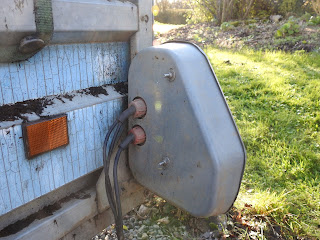A recent check of the trailer lights showed that the left-hand red rear light that should come on with the headlights wasn't working. All the other main lights seem to be OK. No problem, I can change the bulb.
First, take the bulb out to see what kind it is, and also confirm that one of the filaments is dead. So I undo the two nuts on the back of the mounting, to discover that they hold the bulb enclosure onto the chassis, and undoing them doesn't give access to the bulbs. So I bolt it back on, and undo the three screws at the front.
I take out the bulb, test it, it's fine. Hmm problem is elsewhere. I shuffle myself under the trailer to try to trace the wiring. After spending some time doing this, I notice that the white bulb at the front on the left is also not working, neither is the left-hand one that lights up the number plate. Hmm problem is somewhere along the supply to that side. Possibly the plug (trailer) or perhaps the socket (car). So I download and copy a plug connection diagram from the web, and identify the two connections (power and earth) for the left-hand bulbs.
After spending a while checking these out, I realise that the strange results I am getting are because the diagram shows the plug from the pin side and not the wire side, so I start again. I confirm that the plug connections see a resistance consistent with there being light bulbs correctly connected to it. Time to check out the socket.
So I check the socket and there is a voltage on the correct pins when the headlights are on. At this point I'm not sure what's happening, but there's a last test to do, which is to put 12 volts onto the plug pins and see what happens.
At this point I should mention that Anita is sometimes sceptical about my purchases of things that I tell her will probably come in handy one day. A case in point is the variable power supply that I bought for use in those situations when I need to reliably supply a voltage to check something out (or charge batteries). This fine device is what I now use to see what happens.
What happens is that all three of the left-hand trailer lights come on as they should. So the only thing left is that the plug is not connecting properly to the socket. So I bend the socket pins to make a more reliable connection.
Problem solved. And I thought it was going to be a quick bulb change.





I've just recently bought a second power supply! Nothing wrong with the first one (by Maplin), but the new one goes up to 30 volts and can supply up to 10 amps. This means I can use it for testing 24 volt equipment - the Maplin jobby only went up to 20 volts. That was also not enough to fully charge a typical 18 volt cordless drill battery pack.
ReplyDeleteI trust you know that left & right car sidelight circuits are normally on separate fuses? This is intentional to avoid a situation where ALL rear lights fail. According to my information these should be pin 7 (LHD), & pin 5 (RHD) respectively.
Hi Microdave, yes, the rear light circuits are as independent as they can be - separate wiring on the trailer too.
ReplyDeletePlease be careful charging an 18V battery pack with a standard PSU. An 18V pack necessarily has cells in series and if these are Lithium-based, it's very important not to overcharge any individual cell. If they are in series, they might not not all charge equally, some can be undercharged and others overcharged. Somtimes the batteries have the necessary circuitry on-board to cope with this feature, but if not, things could get hot.
Don't panic - my battery packs are all NiMh. Yes, I'm aware of the "Cell balancing" requirements of Lithium packs, and will bear that in mind if I (eventually) get dragged, kicking & screaming into the modern world. On that subject, you might like to see what the people who repurpose used Lithium cells into DIY "Powerwalls" get up to!
ReplyDeletehttps://secondlifestorage.com/index.php
Hi again microdave, thanks for the link - most interesting.
ReplyDeleteI figured you would know about the LiPo balancing, but thought that less aware readers might see your comment and decide to charge their LiPos that way....
M